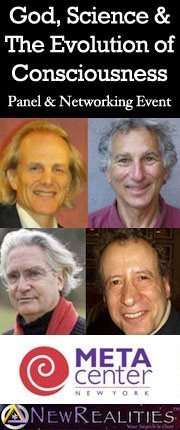God, Science, and the Evolution of Consciousness
November 26, 2012
 Meta center 214 w 29th st-16th floor (between 7th & 8th) Howard Bloom in dialog with Kurt Johnson, coauthor of Nabokov’s Blues and of The Coming Interspiritual Age and Richard Grossinger, author of Dark Pool of Light
Meta center 214 w 29th st-16th floor (between 7th & 8th) Howard Bloom in dialog with Kurt Johnson, coauthor of Nabokov’s Blues and of The Coming Interspiritual Age and Richard Grossinger, author of Dark Pool of Light
Howard Bloom is author of The God Problem: How A Godless Cosmos Creates. A stone-cold non-spiritualist, a scientific thinker devoted to scientific explanation. Yet in his bookstore appearances, Bloom has delivered a talk urging science to pay serious attention to the material power of immaterial things.
No, Bloom is not talking about ghosts or strange mystic powers. He is talking about the mystery of well-known phenomena like an ocean wave.
A wave, Bloom points out, does not exist. What? A wave does not exist? Of course it exists. As the survivors of the tidal waves that killed 230,000 in Indonesia in 2004 and 19,000 in Fukushima, Japan, in 2011 will tell you. But Bloom points out that when a wave travels the 4,600 miles from the center of the Pacific to the coasts of Asia, nothing travels. No thing.
If you were a water molecule in mid-ocean, you would simply bob up and down in place. You would not travel more than 60 feet. When you bobbed up, you would make the peak of one wave. When you bobbed down you would make a trough. When you bobbed up again, you would make a peak of yet another wave. Yes, another wave. One with an identity all its own.
No thing travels the 4,600 miles from the middle of the Pacific to the Asian coast.
But if no thing travels across the face of the Pacific, how in the world does a single wave retain its form? Or, to put it differently, from one moment to the next, the wave is composed of totally different molecules. So how does the wave continue to assert its shape and its one-ness, its thing-ness, its identity?
That’s one of the questions Bloom poses in The God Problem: How A Godless Cosmos Creates. And it’s a question that has glued audiences to their seats for up four hours straight at the Harvard Coop, The Columbia University Bookstore, and Books-a-Million in Washington, DC.